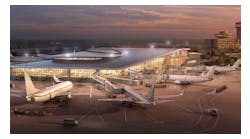Schiphol on April 4 presented a series of decisions that it says will lead to quieter, cleaner and better aviation.
At a glance, those decisions include:
- New rules with clear limits for noise and CO2 emissions -- Schiphol wants a system that focuses on the structural reduction of noise and CO2 emissions in line with the Paris climate agreement, and not on the number of air transport movements, no later than 2025-2026.
- The noisiest aircraft are no longer welcome -- In order to reduce noise nuisance, Schiphol wants to take a stricter approach regarding noisier aircraft by gradually tightening existing standards for aircraft that are allowed to take off from and land at Schiphol.
- No take-offs between 00:00 and 06:00, no landings between 00:00 and 05:00 -- This means 10,000 fewer night flights each year. The airport also wants to limit the reallocation of flights to the very start or very end of the night/early morning as much as possible.
- No more private jets and small business aviation at Schiphol -- These aircraft cause a disproportionate amount of noise nuisance and CO2 emissions per passenger (around 20 times more CO2 compared to a commercial flight). About 30% to 50% of these private jet flights are to holiday destinations like Ibiza, Cannes and Innsbruck. Sufficient scheduled services are available to the most popular destinations flown to by private jets. Capacity for social traffic like police and ambulance flights will remain unchanged.
- No additional runways
- Annual investment of €10 million in local environment and residents -- Together with the central government, Schiphol is setting up an environmental fund for the local area. Between now and 2030, Schiphol will be making a total of €70 million (€10 million per year) available so that investments can be made in innovative construction concepts, home insulation and area development for an improved living environment.
- Safeguarding cargo -- Schiphol wants to safeguard cargo by keeping 2.5% of the available take-off and landing slots available for cargo. Due to international slot regulations, cargo flights are currently struggling to keep their slots at Schiphol.
- People first -- The focus has been on low costs for too long and a new approach is needed: everyone at Schiphol matters. Schiphol is committed to better pay in all sectors, better protection of employees against emissions, less competition in the handling sector and an improvement in working conditions for all (baggage) handing employees.





